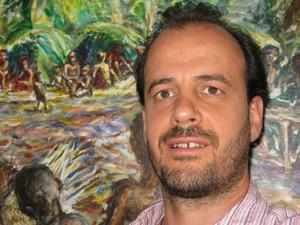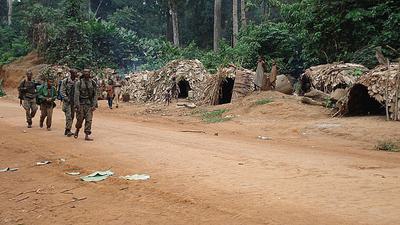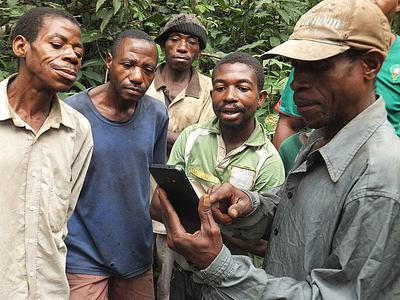Human rights abuses committed in the name of conservation are, sadly, nothing new, says Jerome Lewis, a British anthropologist who has lived with the Baka for much of the past three decades and who has personally witnessed many of the abuses detailed in the UN report. In an interview with Yale Environment 360, Lewis notes that across Africa, the Maasai are currently being evicted from the Ngorongoro Crater in Tanzania, the Okiek from the Mau Forest in Kenya, and Pygmy groups throughout the Congo Basin are being restricted to ever-smaller areas and are largely unable to maintain their nomadic hunting life.
Lewis says that while officials at the Swiss headquarters of WWF (the World Wide Fund for Nature) may have had good intentions in funding park guards, the reality on the ground is that some eco-guards have been co-opted by criminal gangs involved in the bushmeat trade and illegal resource extraction. “It’s wasting so much money, it’s doing a disservice more broadly in the region, and it’s completely destabilizing cultural and bio-cultural systems,” says Lewis.
The solution, he says, is for indigenous peoples such as the Baka to be allowed to remain in their homelands and play a key role in protecting their own resources, rather than outsourcing protection to groups of armed men.
“Local people are the best conservers of the areas they inhabit and have the most interest in doing that well,” says Lewis. “We need to empower local communities with the tools that allow them to monitor their forests, according to their values. Wherever we find indigenous people and cultural diversity, we find biological diversity.”
Yale Environment 360: Could you describe your time in the Congo studying the Baka people?
Jerome Lewis: We’ve been going back regularly over the last 26 years. I was just there in December. It’s been typical long-term anthropological research. I speak the language fluently. My whole family is integrated into their communities. I’ve mostly worked on egalitarian politics, language, music, dance, ritual, and myth.
“Men and women have been beaten and had other serious injuries inflicted on them by eco-guards.”
e360: What’s your take on the UNDP report about the abuse of the Baka by eco-guards?
Lewis: I’ve written papers on the abuses of local people by eco-guards. I’ve been considered an activist by some conservation organizations. I don’t think I’m an activist, I’m simply reporting what I find in those places, and some of those things are unacceptable from a human rights perspective.
e360: So the eco-guards are Congolese government guards who are trained by the Congolese government and WWF, is that right?
Lewis: That relationship is complex and somewhat obscure. In the early days in the late 1990s when eco-guards were set up, they were completely managed, trained, organized, and paid for by the conservation organizations. But because in Central Africa you have this culture of militia big men arming groups of young men to get access to resources, that approach just resulted in another group of young armed men for elites to manipulate to serve their interests. And the control of bush meat in the illegal wildlife trade was clearly where their advantage is gained. The conservationists tried hard to control them, but it wasn’t always possible and the illegal wildlife trade and abuses of local people continued. And some of the guards became much more classic militia in their behavior, and would terrorize, beat up, and take advantage of local communities like the Baka, who didn’t have political support that other groups had. The big organizers of illegal wildlife poaching tend to be wealthy, well-connected individuals who sought to gain from the illegal wildlife trade — the local judge, the chief of police, the colonel in charge of the military detachment. And they would recruit eco-guards to work for them.
Reports of the abuses of local people represented a major reputational risk for conservationists. So the solution for groups like WWF and the Wildlife Conservation Society (WCS) was to push the government to take over the eco-guards, so that the government was the formal employer of the eco-guards in order [for conservation groups] to distance themselves from the behavior of the guards. That made for a very perverse situation where the conservationists were essentially training and organizing the eco-guards, but had no ability to discipline them. So when eco-guards were found to be doing things that weren’t acceptable, it was now impossible for the conservationists to sack them. In Northern Congo, we had a very perverse situation where the head of the eco-guards was married to the most prolific wildlife trader in the region.
Currently WWF UK, which supported the eco-guards active in the Congo’s Messok Dja region, is being investigated by the UK Charity Commission to see if their funds have been used to support groups perpetrating human rights abuses.
The problem for organizations like WWF and WCS is in funding these parks. It’s very expensive to run these military detachments. It’s quite common in these national parks for about 80 percent of their funding to be spent on these military units that travel around the parks trying to impose their presence. And it creates such friction with local communities because when you arm young men, they take liberties with their power. This approach — of closing off areas to local people and violently imposing exclusion zones to protect wildlife — fails because it is coupled with governments simultaneously opening up neighboring areas for intensive exploitation by extractive industries and commercial plantation companies. It is the road building, land-use change, and extractive activities conducted by these companies that are the root drivers of biodiversity loss in these regions. This is the structural problem that conservation is facing, and why it’s essentially ineffective.
e360: The eco-guards often wrongfully accuse the villagers of poaching?
Lewis: The eco-guards have difficulty in stopping the big commercial poachers because of their sponsors’ connections, so they visit local villages and camps and wherever they find a villager or Pygmy who has meat [for their families], they accuse them of being a poacher and then punish or arrest them. There have been plenty of cases of men and women being beaten, having their teeth knocked out, ribs broken, and other serious injuries inflicted on them by eco-guards in the course of these controls. One of my friends was even tied up and left on the forest floor with all the ants and various creepy crawlies that run around. He was quite traumatized. Local people say they are terrorized.
e360: What are the incentives for the eco-guards to behave in the way that they are behaving?
Lewis: Many conservation organizations now document their success in terms of arrests made, of kilometers walked by eco-guards, of seizures of meat and of illegal guns. They are quantifying their conservation success in terms of the repressive actions that they finance, rather than species abundance or ecosystem health. Eco-guards want to be seen doing something, even though they can’t actually address the real problem that everyone wants to address because that’s due to corruption and nepotism.
e360: The big commercial bush meat trade is a real problem?
Lewis: Of course, it’s a massive problem. It’s no longer somebody going out for their family, for a little meat to help them survive. That’s been going on for millennia and communities have traditional rules to manage this. It’s the way that ecosystem has co-evolved with human beings.
e360: How do the Baka incorporate conservation into their traditional ways?
Lewis: Local people value the forest because it is an abundant resource. So all their efforts to manage the forests are focused on assuring it remains abundant. Now this is directly opposed to the way that conservation and westerners view forest resources. The scarcer a resource is, the higher it is valued. The value system of western capitalism is based on scarcity, on the difficulty you have in obtaining something. And what the loggers and the conservationists are doing is hoarding. They are hoarding animals for themselves, they’re hoarding logs for themselves.
“By denying people the right to hunt, you’ve effectively criminalized half the population and their right to their livelihood.”
From the local perspective, the hunter-gatherer perspective, that is what’s causing scarcity in the forest. From their point of view, forest management is all about ensuring that abundance remains, and the principle process by which you do that is by sharing equally with everyone whatever you take out of the forest. That is their golden rule.
e360: What has the impact been of keeping the Baka out of the forest?
Lewis: The Baka and the larger group they are a part of, the BaYaka, are hunter-gatherers, they’re not farmers, they’re not fisher folk. As a man, your primary way of contributing to your household is through hunting and honey collecting. So by denying people the right to hunt, you’ve effectively criminalized half the population and their right to their livelihood. And that leads to some very serious problems with alcoholism, with men working as day laborers on farms. They’ve no longer got another means to supply food for their family. So it all breaks down.
e360: So you feel that it is the totally wrong approach to militarize the situation?
Lewis: Absolutely. It’s wasting so much money, it’s doing such a disservice to conservation more broadly in the region, and it’s completely destabilizing cultural and bio-cultural systems that have made that forest one of the really abundant, biodiverse places on the planet. And, instead, what’s happening is that conservation becomes the handmaiden of so-called development. By creating a park in one place, you justify a massive extractive industry or commercial plantations in other places, and that is what’s impoverishing and destroying the forest. And the roads built by these different extractive industries are what enable these gangs to empty the forest of resources. It’s perverse, and it’s producing results that destroy those areas of the extraordinarily important biodiversity and cultural diversity that remain in the Congo.
e360: If WWF comes to you and says, “Tell us how should we be doing this, we want to protect these areas, we want to protect these resources that are disappearing How should we do it?” What would you say?
Lewis: Well, I have been in many conversations with WWF. The board at least really was unaware of the degree of abuses that go on and there seems to be quite a substantial disconnect between people in Europe and in head offices and people on the ground who are trying to administer these national parks in the context of this extraordinary corruption and military maneuverings. They’re not trained to deal with complex political and economic situations. They’re trained in biodiversity research and ecological monitoring, and so they’re in way over their head.
Baka community members learning how to use an app to report illegal poaching activity. Courtesy of Jerome Lewis
I have a whole set of projects promoting conservation from below — we call it extreme citizen science. From our point of view, local people are the best conservers of the areas that they inhabit and have the most interest in doing that well. So we empower local communities to manage their space as they see fit, we give them tools to record systematically what they’re seeing in their area. For instance, we have Baka Pygmies around a reserve in Cameroon who are collecting evidence of poaching. They know who all the poachers are. They can name them, they can tell you where they live, they can tell what they’re going into the forest to get and when they’re planning to come out. But local forestry enforcement officials only acted on about three or four of these reports in spite of them having received more than 700. And the reason they haven’t acted is because they are part of the illegal trafficking.
Now if the government or authorities were acting responsibly, as they say they were, then we might be in a very different situation. But unfortunately because of the massive increase in the road network into pristine forests, it’s very easy for almost anybody to go in now and take out meat. And so from my point of view, if you really want to address the situation in Central Africa, we need to empower local communities with the tools that allow them to monitor their forests, according to their principles and their values, and then we need to put all the enforcement effort on roads and on vehicles leaving the region.
The only place where I’ve really seen illegal wildlife trade come under control was in a logging concession where the manager was extremely diligent in making sure that his staff, the eco-guards that he ran, were really checking vehicles coming out of that concession. And it was extraordinary that after a couple of years of his work on that concession, you had elephants walking up to the gates of the sawmill because they felt so secure. And that was just by controlling the roads, which are the main exit points. Once people realized they couldn’t get the meat out, they stopped bothering to hunt there. And the forest calmed.
e360: So if indigenous people in the Congo and elsewhere are empowered to protect their forests, the results will be better?
Lewis: Well even if the results aren’t better, the learning remains with that community. One of the big problems with conservation is the rotation of personnel. People are constantly coming and going. Some may last three or four years — five years is a very long time for a conservation person to be stationed in one park — and then they leave. And all the mistakes they made are lost. They hide their mistakes and the problems they cause. They then just move on and the learning is lost.
Whereas if local people are in charge, they may well make mistakes, everyone makes mistakes, but they won’t be moving, so they will keep the knowledge of their mistakes alive. That’s what’s important.
“Cultural diversity and biological diversity are mutually enhancing and almost always coincidental.”
Cultural diversity and biological diversity are mutually enhancing and almost always coincidental, so where you find areas of high cultural diversity, you will find areas of high biological diversity. And the reason is because human beings are keystone species in the ecosystems we inhabit. So wherever we dwell, we have an inordinate influence on the unfolding of that particular ecosystem. For instance, the BaYaka do what’s called para-cultivation, which is a process by which you enhance the production of wild species without domesticating them. So when people collect wild yams, they will take a piece of the liana vine on which the wild yam grew and they’ll plant it back in the soil after they’ve finished collecting the yams, and those will then grow as new yam shoots and produce in six months a whole new lot of yams. And those yams are very important for elephants, for gorillas, for large primates and others. So that’s what you have through human action on that forest. That’s the hunter-gatherers.
Then the farmers, what they’ll do is small-scale slash-and-burn agriculture. And slash-and-burn agriculture where you have low population densities is an extremely productive use of an environment like the Congo rainforest, because it creates small areas of secondary growth where young animals and small animals can easily find young shoots to eat. Plant species and trees that require an initial opening in order to start growing will have that available to them. Secondary forest is very important in the regeneration of whole forest ecosystems. And so for three to five years, those farmers occupy that space where they farm and then they leave it fallow, and in those fallows there is a great deal of biological diversity produced that doesn’t do well in closed-canopy forest.
The point I’m making is that you have two groups of people inhabiting the same space — small-scale farmers and hunter-gatherers — but using it very differently, each contributing to biodiversity in different ways. But overall, their dual presence enriches the biodiversity of that space. And that’s why systematically, right across the globe, wherever we find indigenous people and cultural diversity, we find biological diversity. These two things are mutually enhancing.
This interview has been edited for length and clarity.







In recent years, conservation groups such as WWF have been embroiled in controversy as the poorly trained “eco-guards” these organizations have funded in Africa have been accused of abusing indigenous people in their ancestral territories in national parks and preserves. Last week, a draft report released by the United Nations Development Program (UNDP) found that some WWF-funded guards had routinely beaten members of the Baka forest community, burned down some of their camps, and severely limited their access to a proposed national park in the Messok Dja forests in the northern Republic of the Congo, a stronghold of iconic species like forest elephants. These alleged abuses occurred despite assurances that the Baka — members of a larger group of forest dwellers sometimes referred to as Pygmies — would be allowed continued access to the homeland on which they depend for food and medicine.